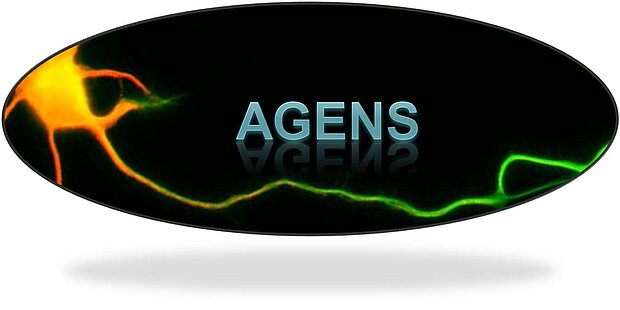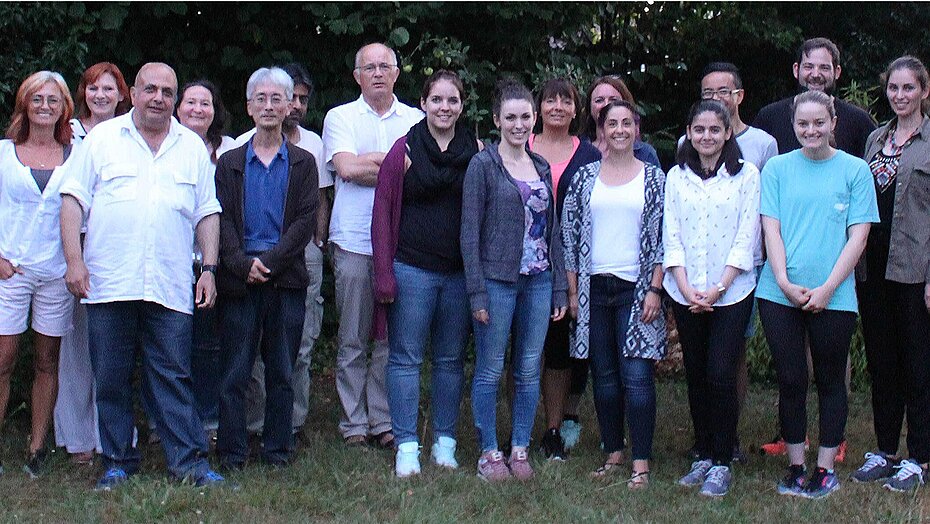
AGENS
The Enteric Nervous System Research Group (AGENS) headed by Prof. KH Schäfer (HS KL) has been working for years on the characterization of the ENS in the context of development, changes in disease patterns, or the use of the enteric neural stem cells contained in it.1,2 First indications of an influence of local inflammation on these neural stem cells have already been found in the investigation of enteric glial cells in patients with inflammatory bowel diseases. A systematic investigation of the effects of the bacterial lipopolysaccharide LPS on the proliferation of postnatal neural stem cells of the CNS and ENS showed its direct stimulatory influence3. The anti-inflammatory effect of fungal agents has already been successfully demonstrated in this context4.

A central focus of the group is the role of the ENS in neurodegenerative diseases. Here, i.e. it could be shown that the ENS also affects the intestinal nervous system in a disease that tends to affect cognitive abilities, such as Alzheimer's disease. In an animal model, changes in the ENS were observed long before changes in the CNS5. This also applies to Parkinson's disease.
Interstingly, the microbiome seems to play a central role in neurodegenerative diseases and is altered in both diseases 6,7.
What is ultimately responsible for the involvement of the intestine and its nervous system is being investigated in studies, which examine among others the effects of environmental factors such as nutrition or environmental toxins on the aetiology of these and other diseases 8,9,10.
1 Isolation of high-purity myenteric plexus from adult human and mouse gastrointestinal tract. Grundmann D, Klotz M, Rabe H, Glanemann M, Schäfer KH.Sci Rep. 2015 Mar 20;5:9226. doi: 10.1038/srep09226.
2 Demir IE, Schäfer KH, Tieftrunk E, Friess H, Ceyhan GO. Neural plasticity in the gastrointestinal tract: chronic inflammation, neurotrophic signals and hypersensitivity. Acta Neuropathol. 2013. 125(4):491-509.
3 Di Liddo R, Bertalot T, Schuster A, Schrenk S, Tasso A, Zanusso I,Conconi M, Schäfer KH. Anti-inflammatory activity of Wnt signaling in enteric nervous system: in vitro preliminary evidences in rat primary cultures. J Neuroinflammation. 2015 Feb 3;12(1):23.
4 Schreiber D, Marx L, Felix S, Clasohm J, Weyland M, Schäfer M, Klotz M, Lilischkis R, Erkel G, Schäfer KH.Anti-inflammatory Effects of Fungal Metabolites in Mouse Intestine as Revealed by In vitroModels. Front Physiol. 2017 Aug 7;8:566. doi: 10.3389/fphys.2017.00566.
5 Semar S, Klotz M, Letiembre M, Van Ginneken C, Braun A, Jost V, Bischof M, Lammers WJ, Liu Y, Fassbender K, Wyss-Coray T, Kirchhoff F, Schäfer KH. Changes of the enteric nervous system in Amyloid Precursor Protein transgenic mice correlate with disease progression. Journal of Alzheimers Disease, 2013, 36(1):7-20. doi: 10.3233/JAD-120511.
6 Unger MM, Spiegel J, Dillmann KU, Grundmann D, Philippeit H, Bürmann J, Faßbender K, Schwiertz A, Schäfer KH. Short chain fatty acids and gut microbiota differ between patients with Parkinson's disease and age-matched controls. Parkinsonism Relat Disord. 2016 Aug 26. pii: S1353-8020(16)30323-6. doi: 10.1016/j.parkreldis.2016.08.019.
7 Brandscheid C, Schuck F, Reinhardt S, Schafer KH, Pietrzik CU, Grimm M, Hartmann T, Schwiertz A, Endres K. Altered Gut Microbiome Composition and Tryptic Activity of the 5xFAD Alzheimer's Mouse Model. J Alzheimers Dis. 2017;56(2):775-788. doi: 10.3233/JAD-160926.
8 Fichter M, Klotz M, Hirschberg DL, Waldura B, Schofer O, Ehnert S, Schwarz LK, Ginneken CV, Schäfer KH. Breast milk contains relevant neurotrophic factors and cytokines for enteric nervous system development. Mol Nutr Food Res. 2011 Oct;55(10):1592-6. doi: 10.1002/mnfr.201100124.
9 Heuckeroth RO, Schäfer KH.Gene-environment interactions and the enteric nervous system: Neural plasticity and Hirschsprung disease prevention. Dev Biol. 2016. doi: 10.1016/j.ydbio.2016.03.017.
10 Disorders of the enteric nervous system — a holistic view, B. Niesler, S. Kuerten, E. Demir, KH Schäfer, Nature Reviews Gastroenterology and Hepatology, accepted 2020.

Forschungsschwerpunkt Integrierte Miniaturisierte Systeme FB IMST, Seniorprofessor FB IMST, Projekt Charakterisierung enterischer neuronaler Stammzellen FB IMST, Projekt Darmfunktionsdiagnostik FB IMST, Projekt ImmENS, Interaktion des Mikrobioms mit dem Enterischen Nervensystem (ENS), Projekt Intrinsische Stammzellen FB IMST, Projekt Modifizierung und Anwendung von Multielektrodenarrays zur Erfassung neuraler Signale des ENS, Projekt Offene Digitalisierungsallianz für die Pfalz, AG ENS, Projekt Transplantation neuraler Stammzellen zur Behandlung von Aganglionosen, Projekt Untersuchungen der Darmmotalität und des Darmnervensystems im Kontekt neurodegenerativer Erkrankungen, Working Group Enteric Nervous System
- +49 631 3724-5418KarlHerbert.Schaefer(at)hs-kl(dot)de
- Campus Zweibrücken
- Room H136/ H205
